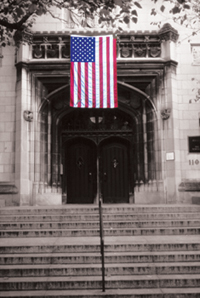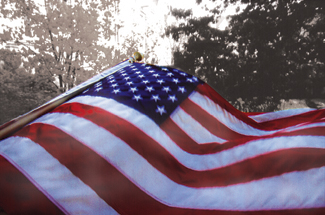The
remains of the day
>>Just
War versus Holy War
 If
you take Osama bin Laden's messages or dictates seriously-and
I believe we are well advised to do precisely that-the war he
has declared against America is one that pits "infidels"
against true believers. Infidels are all Christians, Jews, Muslims
who do not share his extremist beliefs, and any and all unbelievers-to
the man, woman, and child, without exception. He has made it explicit
that in the struggle against the infidel no one is exempt-that
he and his terrorist network make no distinction between those
who wear and those who do not wear military uniforms. Thus, the
horrific attacks of September 11, aimed explicitly at civilians
whose only crime was to board an airplane or to go to work in
the morning, must die in a holy war against infidels.
If
you take Osama bin Laden's messages or dictates seriously-and
I believe we are well advised to do precisely that-the war he
has declared against America is one that pits "infidels"
against true believers. Infidels are all Christians, Jews, Muslims
who do not share his extremist beliefs, and any and all unbelievers-to
the man, woman, and child, without exception. He has made it explicit
that in the struggle against the infidel no one is exempt-that
he and his terrorist network make no distinction between those
who wear and those who do not wear military uniforms. Thus, the
horrific attacks of September 11, aimed explicitly at civilians
whose only crime was to board an airplane or to go to work in
the morning, must die in a holy war against infidels.
This
is a grotesque abuse of a religious tradition. An imam who was
part of a group of us who met with President George W. Bush at
the White House on September 20, only hours before Bush's powerful
speech before a joint session of Congress, expressed his outrage
at this "hijacking" of Islam to evil purposes.
By
contrast, the concepts and language evoked by the President and
by many Americans to characterize the U.S. response to the September
11 attacks is that of a "just war" or a "just cause."
A huge gulf separates the just war tradition from that of a holy
war against infidels. Indeed, the just war concept has been evoked
historically in an effort to counter and to criticize holy war
and crusading efforts-by their definitions enterprises that recognize
no limit. The just war tradition consists of two parts. The first
part evaluates the occasions for war. A war must be declared by
a legitimate authority; it must be a response to direct aggression
and thus a redress to grievances; it can be triggered by knowledge
that innocents (defined as those in no position to defend themselves)
remain in harm's way unless an effort is made to interdict by
force those who aim to harm them.
The
second part of the tradition evaluates the means deployed in pursuing
a just cause. There are two central categories here-those of discrimination,
or noncombatant immunity, and of proportionality, or a determination
to use only the means necessary to achieve a given end, whether
that be just punishment for an act of aggression or interdiction
in order to prevent further harm. You don't, for example, unleash
a nuclear weapon when some other means will do the job. (Indeed,
for nearly everyone in the just war tradition, you are never permitted
to use nuclear weapons.) Noncombatant immunity is critical. This
does not mean that civilians never come in harm's way. It does
mean that they must not be the intended targets of attack. That
the United States takes the rule of discrimination seriously is
generously attested to by our foes who consistently put their
own civilians in harm's way by placing them near military targets
or bringing military targets to civilians.

Knowing
that U.S. rules of engagement involve multiple restraints on targeting;
knowing that American pilots put themselves in harm's way rather
than to indiscriminately unload their ordnance, our opponents
do everything they can to increase the likelihood that their own
civilians become collateral damage. This makes it more difficult
for us to fight certain sorts of foes, to say the least, but it
is a restraint vital for America to observe. It is in fact something
remarkable in the annals of warfare to see American military commanders
go on television to apologize for civilian casualties. One is
unlikely to find bin Laden doing that anytime soon. Quite the
opposite: he exults in killing as many noncombatants as possible.
That is the difference between an extremist holy war philosophy
and a restrained just war approach.
When
American presidents, as they are wont to do, conclude their speeches
with, "May God bless America," this is not a triumphalist
act of rhetorical bravado. It is, instead, an indication that
the nations lie under judgment and that all nations and leaders
are in need of divine guidance. Those who do not believe in anything
divine do not believe anyone requires such guidance. But this
has not been the dominant American tradition, from George Washington
on down. If a President evoked the deity in a proclaimed desire
to kill as many people as possible, that would be offensive; indeed,
it would be something far worse. Asking for a blessing is a supplication,
not a war cry.
Jean
Bethke Elshtain, the Laura Spelman Rockefeller professor of social
and political ethics in the Divinity School, was among some 20
American religious leaders invited to meet with George W. Bush
at the White House in the aftermath of September 11. She is the
author of many books, including Jane Addams and the Dream
of American Democracy: A Life (Basic Books, 2001), and serves
as cochair of the Pew Forum on Religion and American Public Life.
Ethicist
Jean Bethke Elshtain:
Just
War versus Holy War
Iconologist
W. J. T. Mitchell:
The
War of Images
Philosopher
Jonathan Lear:
"Why
do they hate us so much?"

![]()
 If
you take Osama bin Laden's messages or dictates seriously-and
I believe we are well advised to do precisely that-the war he
has declared against America is one that pits "infidels"
against true believers. Infidels are all Christians, Jews, Muslims
who do not share his extremist beliefs, and any and all unbelievers-to
the man, woman, and child, without exception. He has made it explicit
that in the struggle against the infidel no one is exempt-that
he and his terrorist network make no distinction between those
who wear and those who do not wear military uniforms. Thus, the
horrific attacks of September 11, aimed explicitly at civilians
whose only crime was to board an airplane or to go to work in
the morning, must die in a holy war against infidels.
If
you take Osama bin Laden's messages or dictates seriously-and
I believe we are well advised to do precisely that-the war he
has declared against America is one that pits "infidels"
against true believers. Infidels are all Christians, Jews, Muslims
who do not share his extremist beliefs, and any and all unbelievers-to
the man, woman, and child, without exception. He has made it explicit
that in the struggle against the infidel no one is exempt-that
he and his terrorist network make no distinction between those
who wear and those who do not wear military uniforms. Thus, the
horrific attacks of September 11, aimed explicitly at civilians
whose only crime was to board an airplane or to go to work in
the morning, must die in a holy war against infidels. 